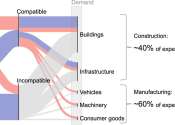Enhancing resilience of urban public transport systems through greater network interconnectedness
Cities are fortifying the resilience of their urban infrastructure networks to tackle potential unforeseen disruptions, particularly due to extreme weather resulting from climate change. Recently, researchers from City University ...
Jan 19, 2024
0
13









